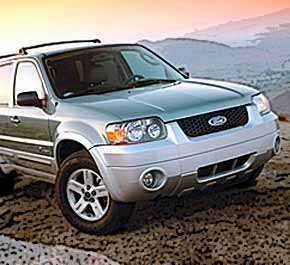|
Hybrid
Buzz
Hybrid
vehicles have taken the auto world by storm. Ever since Toyota
and Honda introduced their hybrid cars into the marketplace,
the demand has been growing steadily over the years.
Most
of those who have been attracted to the new lines of hybrids
do so out of regard for the environment followed by a desire
to lessen this country's dependence upon foreign oil and save
a few bucks on high gasoline prices.
 Pictured
is the Ford Escape Hybrid SUV.
Pictured
is the Ford Escape Hybrid SUV. |
|
Hybrid
Vehicles - Not Just Hybrid Cars
Hybrid cars may have been the first on the market, but the
market has expanded to include other hybridized vehicles as
well. Hybrid SUVs, trucks, minivans, buses and motorcycles are
all either in development or on the market as we speak.
Hybrids
See Green
Hybrid manufacturers have been seeing green because of the
popularity and demand for such vehicles. But, this demand is
mostly because consumers are seeing a different green in that
they hope for a greener environment. Hybrid cars form a class
of 'green vehicles' that offer very low to zero emissions and
take a step towards making this dream come true.
In fact, the American Automobile Association (AAA) in its
Westways magazine and ACEEE's Green Book both outline five
different levels of low emission vehicles. Zero-emission,
partial zero-emission, super-ultra-low-emission, ultra-low-emission
and low-emission vehicles all help the environment by putting
less pollutants into the air than traditional vehicles.
Not all of the greenest vehicles are automobiles, either.
ACEEE's 'Greenest Vehicles of 2005' puts the Ford Escape
Hybrid on the top 12 list as a 36 mpg/city, 31 mpg/hwy,
partial zero emission vehicle.
Hybrids
Use Less Foreign Oil
Gasoline prices have skyrocketed and there is no end in sight
to the upward trend. By consuming less gasoline as the hybrids
do, we lessen our demand for foreign petroleum products. Less
demand means less dependence.
Hybrid vehicles, especiallly plug-ins, can also be seen as
a logical interim step into the forthcoming hydrogen economy.
Hydrogen cars are now being developed where the only emission
is water and will be expected to hit the showrooms within the
next 5 years.
Consumers want a cleaner environment and less foreign oil dependence
now, though, so hybrid gasoline-electric cars or other alternative
fuel vehicles make sense until this time. Even after this time,
most vehicles will remain hybrids since this will mean fuel
savings no matter which fuel is being used. This is especially
true for plug-in
hybrids, which will most likely be around for decades
to come.
In addition, another interim step may just be the gasoline-hydrogen
hybrid car, which can be seen as a transitory step into fuel
cell vehicles or an internal combustion all hydrogen
car. No matter what though, hydrogen cars are only for
lease with few fueling options outside of California.
For Now ...
For right now, those who want to clean up greenhouse gases
and thumb their noses at Middle East oil can purchase the hybrids
currently on the market from the major automotive manufacturers.
Or a whole slew of plug-in hybrids are just around the corner.
No matter what models the future holds auto insurance
companies will still offer coverage for hybrids.
And because hybrids are not fully electric, companies that sell auto parts and mechanics will still be in existence and thriving even with the new technology of hydrogen fuel cell vehicles just over the horizon.
Green
up now for blue skies tomorrow.
Updated March 19,
2019
|

